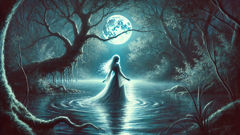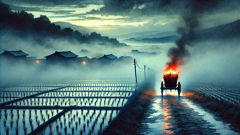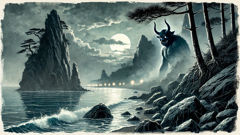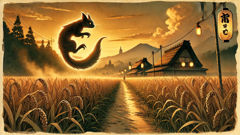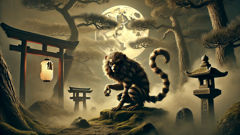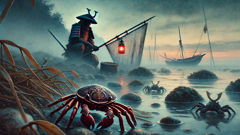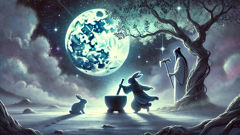Introduction
Mist and moonlight shrouded the silent lake, its waters smooth as polished glass, reflecting the tangled trees that hunched along its banks like ancient sentinels. The Black Forest was a realm of shadows and stories, where the wind spoke in whispers and the pines creaked with secrets. In the hush between dusk and dawn, it was said that old magic stirred. Fishermen and woodcutters alike told tales of rippling shapes at the water’s edge—of songs echoing across the reeds, sorrowful and sweet, never quite human. Of all these stories, none was as haunting, as woven into the heart of the land, as the legend of Undine. She was a spirit born of flowing water, her laughter as light as rain, her eyes deep as the midnight pool. No villager could quite recall when the rumors began—perhaps they were as old as the forest itself. Some believed Undine was a guardian, others, a warning. But all agreed she was not meant for the world of men. This is the tale of how she crossed that threshold, of how love both bound and broke her, and of what it truly means to have a soul.
I. The Fisherman’s Cottage and the Child from the Lake
On the furthest edge of a nameless village, where the Black Forest pressed close and the river bent sharply northward, stood a crooked cottage. Its roof sagged beneath moss and its garden tangled with thyme and wild strawberries. An old fisherman named Hans dwelled there with his patient wife, Bertha. Their lives were simple—hard, but not unhappy—filled with the rhythms of nets, market days, and the warm glow of the hearth on cold evenings.
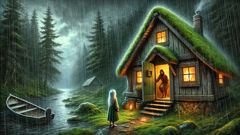
Yet sorrow shadowed their door. For many years, they had prayed for a child. None came. Bertha often wandered to the lake in the hush before sunrise, letting her worries drift away with the mist. One storm-wracked night, as thunder rolled and branches lashed the windows, a strange sound woke them—a wail not quite human, not quite animal. Hans hurried outside, lantern bobbing, and there on the threshold lay a child. She was small and pale, her hair glimmering with droplets, her eyes gleaming like green stones in the lamplight.
They named her Undine. She grew quickly, sprightly and wild, never quite fitting the shape of village life. She slipped away to the water whenever she could, talking to reeds and stones, laughing at things no one else could see. Some neighbors whispered that the couple had taken in a changeling or river sprite. But Hans and Bertha only smiled, for in Undine they found joy—an echo of the daughter they’d always longed for. Still, they could never shake the feeling that she belonged as much to the lake as she did to them.
One summer evening, when Undine was nearly grown, a stranger arrived. Sir Huldbrand von Ringstetten—a knight of fair name and troubled spirit—sought shelter from a gathering storm. His horse was spent, his cloak sodden, his face marked by weariness and wonder at the forest’s tangled paths. Hans welcomed him gladly, Bertha set a stew upon the fire, and Undine watched with bright, curious eyes. She asked questions no ordinary girl would dare—why his sword was so sharp, whether he believed in lake spirits, whether he’d ever seen a rainbow touch the earth. Huldbrand was captivated, drawn as if by an invisible thread.
That night, the storm battered the walls. Huldbrand, unable to sleep, gazed from the window at the restless lake. He saw, or thought he saw, a slender figure wreathed in mist, dancing along the shore. When he blinked, the vision vanished. But the image lingered. Over the days that followed, as the knight’s horse recovered and the forest paths remained impassable with mud, Huldbrand and Undine spent long hours together. They wandered beneath towering pines, skipped stones across the lake, told stories by lamplight. Something new and fragile took root between them—wonder, perhaps, or the first tremors of love.
Bertha watched her foster daughter with anxious pride, sensing changes she couldn’t name. Hans grew thoughtful, glancing often toward the water. The villagers muttered of omens, uneasy at the knight’s presence and the girl’s growing beauty. Yet for a time, all was peace.
It could not last. One night, as a strange hush fell over the forest, Undine vanished. Hans and Bertha searched in vain, calling her name through mist and darkness. Huldbrand, frantic, plunged into the woods, guided only by the memory of her laughter. At the lake’s edge he found her, standing knee-deep in moonlit water. Her eyes shimmered with tears.
“I am not what you believe,” she whispered. “I am of the water. If I marry a mortal man, I may gain a soul. But if you betray me, all that I am will be undone.”
Moved by a love he scarcely understood, Huldbrand knelt in the sand and pledged himself to her. By dawn, they were wed, with Hans and Bertha as witnesses and the lake’s quiet blessing. Yet even as joy filled the cottage, shadows gathered in the depths.
II. The Castle on the Rhine: Shadows of Love and Jealousy
With Undine now Lady of Ringstetten, Huldbrand carried her away to his ancestral castle on a rocky rise above the Rhine. The journey was swift but strange—the woods seemed to part for her, the river’s currents to sing. As they neared the castle, she paused to watch the water flow beneath ancient arches, silent and thoughtful.
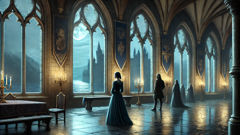
The keep itself was grand yet cold, filled with tapestries depicting long-vanished knights, and windows that caught the changing light from the river below. Servants whispered about their new mistress, awed by her beauty and odd ways. She moved through shadow and sunlight as if she belonged to neither. Her laughter could dispel gloom in an instant, but sometimes she fell silent, staring at the river or singing soft melodies that made even the oldest stones seem to listen.
At first, happiness reigned. Huldbrand’s friends marveled at his bride’s grace. Undine charmed the villagers with her kindness, easing feuds and tending the sick with uncanny skill. Yet not all welcomed her. Chief among the doubters was Bertalda, daughter of a local nobleman and once Huldbrand’s close companion. Jealousy gnawed at her heart. She noted every odd glance, every time Undine’s attention strayed to the river, every secret smile that passed between husband and wife.
Bertalda’s suspicions were stoked by an old crone who muttered of river folk and faerie brides. Rumors blossomed. Was Undine bewitched? Had Huldbrand been ensnared by magic? The castle’s halls grew heavy with whispers, and even Huldbrand’s trust began to waver in the face of so much doubt.
Undine, sensing the change, grew wan and quiet. She pleaded with Huldbrand to trust her, to remember his vow beside the lake. Yet fear crept in—fear of losing him, fear of her own nature. One evening, as the moon silvered the river, Undine confessed her secret to Bertalda. “You think me strange, but you do not know what it is to yearn for a soul.”
Bertalda, more moved than she wished to admit, promised silence. But in her heart, resentment smoldered. She watched as Huldbrand grew distant, troubled by dreams and doubts he could not voice. The castle itself seemed to darken, its stones cold beneath Undine’s feet.
At a grand feast in Bertalda’s honor, things came to a head. The old crone appeared unbidden, declaring before all that Bertalda was no noble’s daughter but a foundling from the river—rescued as a babe by fishermen. Chaos erupted. Bertalda fled in shame; Huldbrand tried to comfort her, but Undine alone seemed calm, her eyes ancient and sad. That night, as storms battered the castle walls, she slipped away to the river’s edge, seeking solace in the flow of water and memory.
Yet trouble found her. From the depths emerged Kühleborn, a spirit of the river and Undine’s uncle, fierce and wild as winter’s flood. He warned her: “Your place is not with mortals. Return to us before sorrow takes root.”
Undine refused, clinging to her love and newfound humanity. But the warning lingered. When she returned to the castle, Huldbrand met her with coldness born of fear and pride. Their happiness—so brief, so bright—shattered beneath the weight of secrets, suspicion, and the inexorable pull of destiny.
III. The Waters’ Toll: Love, Betrayal, and the Price of a Soul
As autumn bled into winter, peace left Ringstetten’s halls. The river swelled with rain, and winds howled through arrow slits. Undine grew ever more withdrawn; her song faded, her laughter stilled. Huldbrand, tormented by guilt and confusion, turned to Bertalda for comfort. Together they walked beneath bare trees, their footsteps echoing through frost-silvered courtyards. Bertalda’s feelings shifted from envy to something softer, yet Huldbrand could not shake the memory of Undine’s touch—the warmth of her hand in his, the quiet understanding in her eyes.
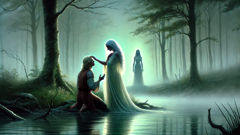
One bitter night, a masquerade was held to drive away the gloom. Huldbrand danced with Bertalda beneath lanterns swaying in the wind. Undine watched from the shadows, heart aching. When the music ended, she found Huldbrand in a deserted corridor. “Do you love me still?” she asked quietly. Huldbrand hesitated, torn by doubt. Undine wept, her tears shining with an unnatural light. “If you turn from me,” she whispered, “I will return to the waters. All that I am will be lost.”
Unable to answer, Huldbrand walked away. That night, Undine vanished. Her absence was felt in every silent room, every darkened window. The river’s song seemed sadder, its currents colder. Bertalda wept for her friend; Huldbrand wandered the banks in despair, calling her name into empty mist.
Weeks passed. Rumors reached Ringstetten of a spirit haunting the river, of white veils glimpsed in the shallows, of songs that stilled the heart. Huldbrand, wracked by longing and regret, resolved to seek Undine no matter the cost. He rode upstream through snow and wind, following whispers and half-remembered paths. At last, deep in the heart of the forest, he found her beside the lake where they’d first met.
Undine was changed—paler, stranger, yet still beautiful beyond words. She greeted him with a sad smile. “You broke your vow,” she said softly. “Yet I cannot hate you. Love binds me still.”
Desperate, Huldbrand begged forgiveness. Undine wept—not for herself, but for him. “My soul is yours,” she said, “but you must let me go.” As dawn broke, Kühleborn rose from the waters, bearing witness to their parting. With a gesture as gentle as falling rain, Undine touched Huldbrand’s brow. A chill swept over him, sorrow and peace entwined. Then she slipped into the lake, her form dissolving into mist and light.
Huldbrand returned to Ringstetten a changed man. He married Bertalda in hopes of solace, but joy eluded him. Each night he dreamed of Undine’s eyes, of her laughter rippling like water. On the night of his wedding feast, as revelers danced and torches flared, a strange hush fell. The wind carried a soft melody—Undine’s song. From the shadows, she appeared, draped in silver and sorrow.
She knelt by Huldbrand’s side. “My love endures beyond worlds,” she whispered. A single tear fell upon his cheek—cool as spring rain. With that touch, Huldbrand’s spirit slipped away, peaceful at last. Undine vanished, leaving only silence and a shimmering veil on the castle’s ancient stones.
In time, Bertalda had a fountain built where Undine’s tears had fallen—a reminder of love’s power to change even the coldest heart. The villagers spoke of Undine not as a curse but a blessing, a spirit who gave up immortality for a mortal’s soul, and who loved so fiercely that even death could not divide her from her beloved.
Conclusion
So endures the legend of Undine—her laughter echoing across waters where mist clings and old secrets sleep. In every ripple of the Rhine and every sigh of the Black Forest pines, her story lives on: a tale of longing and love’s unfathomable depths. She was more than spirit or shadow; she was hope kindled in darkness, proof that even those born apart from humanity can choose kindness, sacrifice, and devotion. The villagers never forgot her. They tended Bertalda’s fountain for generations, tossing flowers and coins into its clear depths. Lovers walked there at dusk, pausing to whisper wishes to the water. And sometimes, on windless nights when stars shimmered in the black lake, someone would swear they heard a song—light as rain and sorrowful as longing—carried across the reeds. Thus did Undine’s yearning for a soul become a part of the land itself: a reminder that love demands courage, that trust is both gift and burden, and that even the briefest touch of grace can change the course of fate forever.

